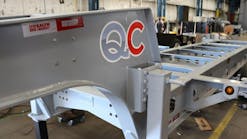ZERO accidents, zero incidents, and zero personal injuries.
These three objectives form the core of the winning safety program at Jack B Kelley Inc, which just earned its first Outstanding Performance Trophy in the National Tank Truck Carriers (NTTC) annual safety contest. The core safety objectives are shared by everyone at Jack B Kelley from the chief executive officer on down.
Quite frankly, these objectives should form the safety program core for every tank truck fleet, vehicle maintenance shop, wash rack, and transloading operation in this industry. Companies in this business — especially those that handle hazardous materials — simply can't afford to settle for anything less.
Not even a down economy should be allowed to jeopardize a safety program. Actually, the recession should be seen as an opportunity to reinvigorate the safety program. A slow business environment offers more opportunities to bring groups of workers together for refresher training in safety and other factors that will enable them to do a better job once the economy turns around.
There are plenty of safety topics to be addressed. NTTC's Safety Council Annual Conference in April provided a broad sampling of safety issues that deserve attention. Issues discussed ranged from driver fatigue and distracted driving to stationary object collisions and cargo tank rollovers.
Driver fatigue is getting plenty of attention, and Jack B Kelley is just one among many tank truck carriers that now includes fatigue management in its training program. A range of fatigue factors are covered, but sleep apnea gets special attention in many programs.
Sleep apnea reportedly plagues a large part of the general population, and truck drivers are not spared. Sleep apnea interrupts the normal sleep cycle, and people with the affliction never get enough rest. A person who habitually gets inadequate sleep has about the same reaction time as someone with a .06 alcohol level in the blood.
Distracted driving may be every bit as bad as fatigued driving, and more training is justified. Ronald Hawkins Jr, a driver for K-Limited Carriers Ltd and a member of the American Trucking Associations Road Team, summed up the distracted driving challenges in this way in a presentation at the NTTC Safety Council annual conference:
“We have terrible distractions on the road. When I first started driving, we didn't have cell phones or computers in the cab. There are challenges every single day. We have to watch out for product surge — and deal with heavy traffic where you really have to pay attention. You have to always be thinking to be prepared for anything that might happen.”
The cell phone is one of the biggest driver distractions today, and texting is creating even more concern. Safety managers stress the need for more aggressive training on the distractions posed by cell phones and other in-cab technology. No-cell-phone-while-driving policies simply aren't enough by themselves.
While data is lacking, many safety managers are convinced that cell phone use and other distractions contribute to crashes into stationary objects at terminals and other facilities. Cell phones also may be contributing factors in rollover accidents.
Stationary impacts happen far too frequently in the tank truck industry, according to safety managers. Drivers often consider the events to be minor and don't understand that these events are symptomatic of general inattentiveness while driving. However, these are costly events that are fully preventable.
Rollovers can carry an even higher price. Every tank fleet must discuss rollover prevention with drivers, because drivers are the key to preventing these tragedies. Speakers at the safety council conference stressed the importance of including a rollover prevention segment in driver training and reinforcing the message periodically. Drivers, dispatchers, and mechanics should be required to attend rollover prevention sessions.
Good training resources for rollover prevention and other safety issues are available from NTTC and other sources, and the volume of material is growing by the month. Bulk Transporter and NTTC conducted a rollover prevention webinar earlier this year as part of a new series of safety webinars. Our next safety webinar is set for July 8 and will address in-cab driver management technology and strategies. We invite fleets to incorporate these webinars into their safety training programs.
Clearly, there are plenty of topics for enhanced safety training. Creating a workforce that is fully invested in safety is the only way to reach zero accidents, zero incidents, and zero personal injuries.
Agree or disagree? Make your voice heard by visiting Bulk Transporter Interactive at bulktransporter.com and clicking on “Contact Us.”








